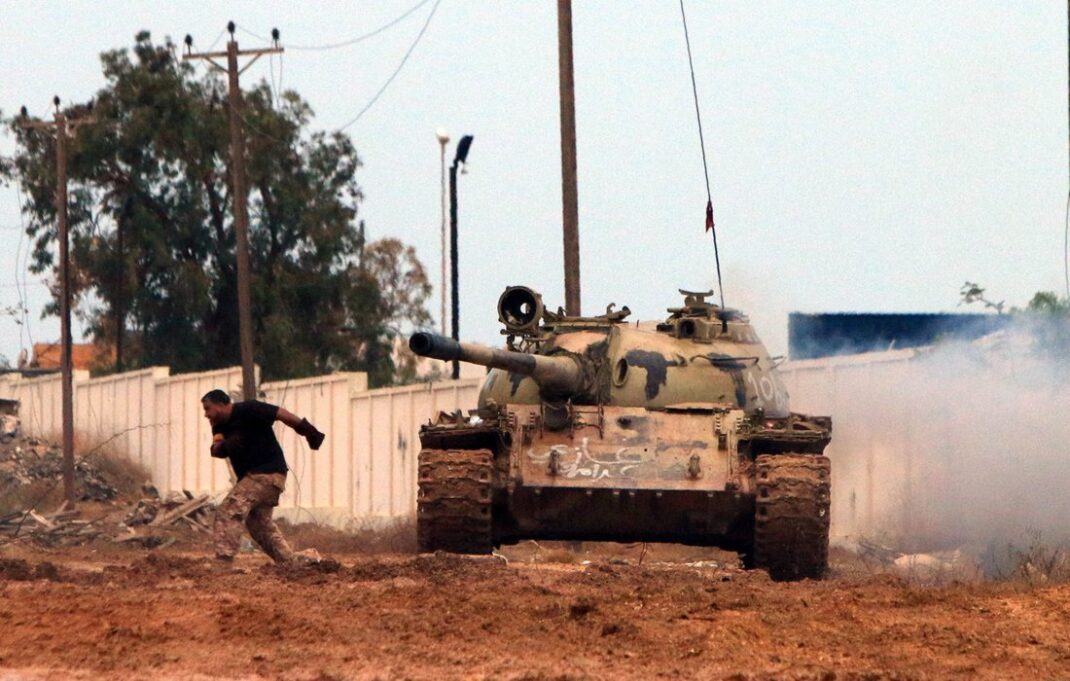By Mohamed Eljarh
 This chapter takes stock of six years of failed efforts to bring stability and political reconciliation to Libya, identifying major local actors involved in post-Gaddafi Libya and focussing on the primary internal barriers to stabilization and an effective transition.
This chapter takes stock of six years of failed efforts to bring stability and political reconciliation to Libya, identifying major local actors involved in post-Gaddafi Libya and focussing on the primary internal barriers to stabilization and an effective transition.
PART THREE
External barriers
Western capitals such as Paris, Rome, London and Washington are divided over how to deal with the crisis in Libya. While they publicly express support for the Presidential Council and GNA in Tripoli, some have also assisted opposing power centres in Libya, including Field Marshal Haftar’s LNA.
Western states pushed ahead on the Skhirat Agreement without the approval of the HoR, disregarding legal and constitutional requirements built into the agreement itself.
The president of the HoR Aguila Saleh and anti-accord HoR members were instrumental in preventing the endorsement of the GNA, thereby stalling the constitutional amendment process required to enshrine the Skhirat Agreement into the interim constitutional declaration.
This meant that the key political institution as envisioned by the Skhirat Agreement became a significant obstacle in the implementation of the agreement on the ground.
Western capitals have effectively pursued their respective interests rather than a real political transition in the country. Indeed, they prioritized the fight against ISIS, control of migrant and refugee flows and, particularly in the case of Italy, energy security. For example, Rome and London have partnered with groups based in Misrata and Tripoli to fight ISIS and people-trafficking networks and – at least until recently – have been in favour of sidelining Haftar.
France has backed Haftar in his war against ISIS and al-Qaeda linked groups, and has argued that Haftar is a key part of any solution in Libya. 23 Such divisions among key international stakeholders only serve to embolden the positions of Libyan actors involved in the conflict, diminishing the chances for compromise.
Despite recent visits by Haftar and Sarraj to Rome and Paris, both cap-itals continue to pursue their own interests in the migration, energy and terrorism files.
Italy continues to support armed militias loyal to the GNA and recently reintegrated under the auspices of the Libyan coast guard to help stop migration flows, although its policy has come under increasing scrutiny from international observers and media.
France on its part has called for a UN Security Council meeting in light of CNN’s explosive report about slavery in Libya. France’s calls for an investigation into the slavery market in Libya will undoubtedly expose the migration policy pushed by Italy in Libya that involves support for ex-smugglers turned coast guards who intercept boats and return migrants to Libya where they face abuse and human rights violations and, in some cases, are sold as slaves. Such developments underline the contradictions and lack of unity in EU policy on Libya.
On the other hand, an alliance between Egypt and the UAE, and to some extent Russia, prioritize unity of what remains of the army (especially Haftar’s Libyan National Army) as the nucleus of a future state.
These actors are also pursuing an extension of their fight against political Islam in the Libyan context, as they are concerned about the influence enjoyed by Islamist militias in Tripoli and their leverage over the Presidential Council.
These actors have given Haftar overt and covert political and military support, as has France on counter-terrorism grounds. Ostensibly concerned with finding a solution to Libya’s divides, this alliance publicly subscribes to the UN-backed peace process but effectively undermines it, while offering no concrete alternative.
On the other hand, Qatar, Turkey and Italy have provided support to groups in Misrata and the Presidential Council in Tripoli. Due to this low-level proxy conflict, opposing Libyan actors have received enough political and financial support to continue the conflict and sabotage the Skhirat process.
That said, the new UN envoy has reiterated on various occasions that foreign meddling in Libya has decreased significantly since he took over. Indeed, both Turkey and Qatar have been embroiled with their own crises:
Turkey witnessing a coup attempt, the failure of its policy in Syria and internal political turmoil; and Qatar under pressure by a coalition of its Arab Gulf neighbours and Egypt due to its support for the Muslim Brotherhood and alleged interference in their internal affairs. However, reduced Qatari and Turkish involvement in Libya comes at the expense of increased Egyptian and Emirati influence.
On the other hand, the recent Africa tours by Qatari Emir Tamim bin Hamad al-Thani and Turkish President Recep Tayyip Erdoğan are a clear indication of a potential comeback by the two regional allies. During their tours, the two leaders covered nine African countries including Libya’s neighbours Sudan, Tunisia and Chad.
The Skhirat Agreement’s underlying objectives – avoiding further military confrontation and preventing financial collapse – appear increasingly out of reach. This is true as armed groups from Misrata and the LNA are amassing near the city of Sirte, which increases the likelihood of an armed confrontation.
Such an event would prevent Libya from increasing exports and would further endanger peace prospects. In the medium and longer term, the failure of the Skhirat Agreement risks escalating clashes and division, also giving radical groups the opportunity to regroup. Today, there is indeed a growing possibility of an ISIS comeback in Libya’s oil-rich region.
To that end, UN envoy Salamé is in charge of UN efforts to find a way to finally implement the LPA. But his action plan is facing serious obstacles and the results are very uncertain, with many political and militia leaders acting as spoilers as they seek to secure their own narrow interests.
In addition to amending the LPA and forming a new unity government, Salamé’s plan includes organizing elections for 2018. The HNEC has already begun updating voter registers. On 6 December 2017, during a press conference with the head of the HNEC, Salamé warned that certain legislative, legal and technical conditions must be met before fair, free and transparent elections can be held in Libya.
Additionally, it is important to lay the groundwork for political and security conditions that enable a healthy environment conducive to a democratic electoral process and debate. However, it is clear that Ghassan Salame’s Action Plan is already facing major difficulties.
The three tracks of amending the LPA – convening a Grand National Conference, constitution-building and general elections – are either deadlocked or nearing complete collapse due to zero-sum politicking by Libyan actors involved in the process. The failure or stagnation of the UN-led peace efforts will leave the door wide open for armed escalations in various parts of the country.
An immediate priority therefore is to embark on a serious dialogue on security issues between key armed factions to avoid the violence that seems to be brewing in Libya’s central region, in and around Tripoli, and across the south.
Avoiding a new confrontation for control of oil and gas facilities in Sabratha, in the southern region and in the oil crescent region is crucial. Moreover, an agreement should be reached with the forces that operate in that region so that the National Oil Corporation can ramp up oil production by conducting the required maintenance and repairs to damaged infrastructure.
It is also critical to ensure the neutrality and integrity of key institutions such as the HNEC, the National Oil Corporation and the Central Bank. Such institutions can be drivers for unity in the nation-building phase that Libya will have to embark on at some point in the future.
Conclusion
The conflict in Libya is driven by an intertwined web of internal and external interests. Libya’s competing armed and political groups have little incentive to engage in genuine political reconciliation efforts as they enjoy substantial support from abroad.
Locally, the institutional divide that involves key Libyan institutions such as the Central Bank and the National Oil Corporation has been particularly damaging as it has deprived the country of essential economic and financial resources.
Overcoming internal obstacles to institution-building and by extension peace and stability in Libya requires a holistic approach that integrates internal actors at both the local and national levels. What is needed is a “grand bargain” aimed at nationwide institution-building and based on a web of relationships between the state and local communities.
The institution-building process must be both bottom-up and top-down si-multaneously. Paradoxically, effective centralized institutions can be consolidated only if the central Libyan government first manages to enhance its legitimacy across communities and regions.
Against this backdrop, UNSMIL must develop a clear strategy to engage with foreign actors with established links to the various local armed groups and political actors in Libya, and use any leverage or influence they have to incentivize these actors to engage in constructive and genuine political and security dialogue.
Egypt is currently leading dialogue efforts between the LNA and some army figures from western Libya to establish a unified command structure for the Libyan armed forces. However, this should not be an Egyptian affair only. Such efforts stand a better chance of success if they are multilateral.
A multilateral approach would address local or regional grievances and concerns in a more effective fashion, encouraging compromise and inclusivity in the process. A multilateral approach spanning both the regional and international levels is therefore the best approach, the only one that can be employed by Western and regional powers to help resolve the Libyan crisis.
2018 comes with significant risks and but also opportunities for Libya.
The risk of renewed escalation increases as various armed groups seek to consolidate their positions on the ground. It further increases if no political settlement is reached between institutions currently engaged in the UN-brokered dialogue, namely the House of Representatives in Tobruk and the State Council in Tripoli.
However, both of these institutions have an incentive to reach an agreement, because the alternative would be armed confrontation and new dynamics on the ground that would sideline and potentially exclude them completely. There is also the risk of complete economic and financial collapse and a worsening humanitarian situation in the country.
The 2018 elections in Libya could offer a way out of the current political crisis by ending the division between political institutions and restoring legitimacy to governing institutions. However, there is no guarantee that the electoral process and election results would be respected.
Also, given the huge trust deficit among Libyan actors and the zero-sum politics that have characterized post-Gaddafi Libya, there is no guarantee that the winners of the election will rule for everyone, which could result in increased tensions and renewed conflict over power and resources.
It is critical that Libya does not go for premature elections that lack the required political, technical, legal and security conditions. There is much groundwork to be done to pave the way for elections to take place in Libya.
It is critical that key international players such as the UN, the EU and the US throw their full support behind the current efforts of UN special envoy Salamé. Reaching agreement on a new unity government that would oversee the transitional phase beyond the 17 December deadline and help pave the way for new presidential and parliamentary elections, as well as a referendum on a permanent constitution, are key stepping stones for the country’s journey towards stability and reconciliation.
If adhered to, such an agreement would help dampen the prospects for armed confrontation and allow much-needed breathing room for Libyans themselves to enact a new and more promising future for the country.
***
Mohamed Eljarh is co-founder and Chief Executive Officer of Libya Outlook Research and Consultancy. A non-resident fellow with the Atlantic Council during 2014-2017, he is an associate expert at the Sahel-Maghreb Research Platform hosted by the Danish Institute for International Studies in Copenhagen.
_______________
Source: Chapter 2 in “SEARCH FOR STABILITY IN LIBYA: OSCE’s Role between Internal Obstacles and External Challenges”. Edited by Andrea Dessì and Ettore Greco.





